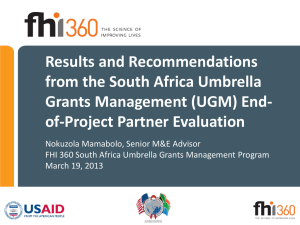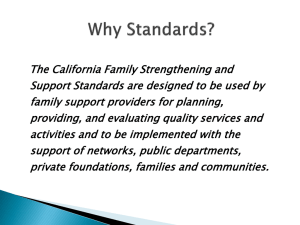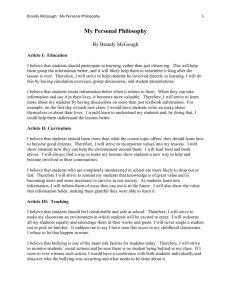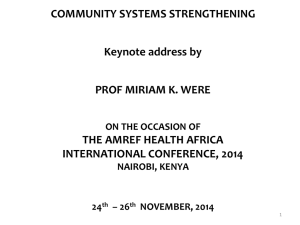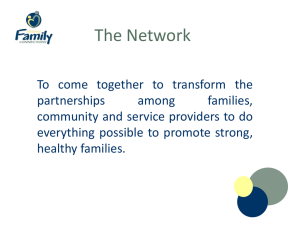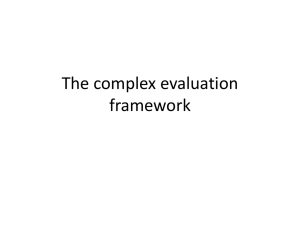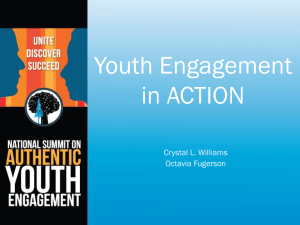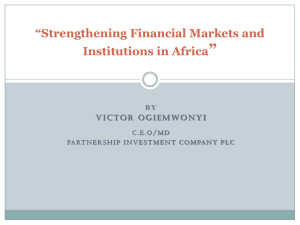Call for Case Study Abstracts
advertisement
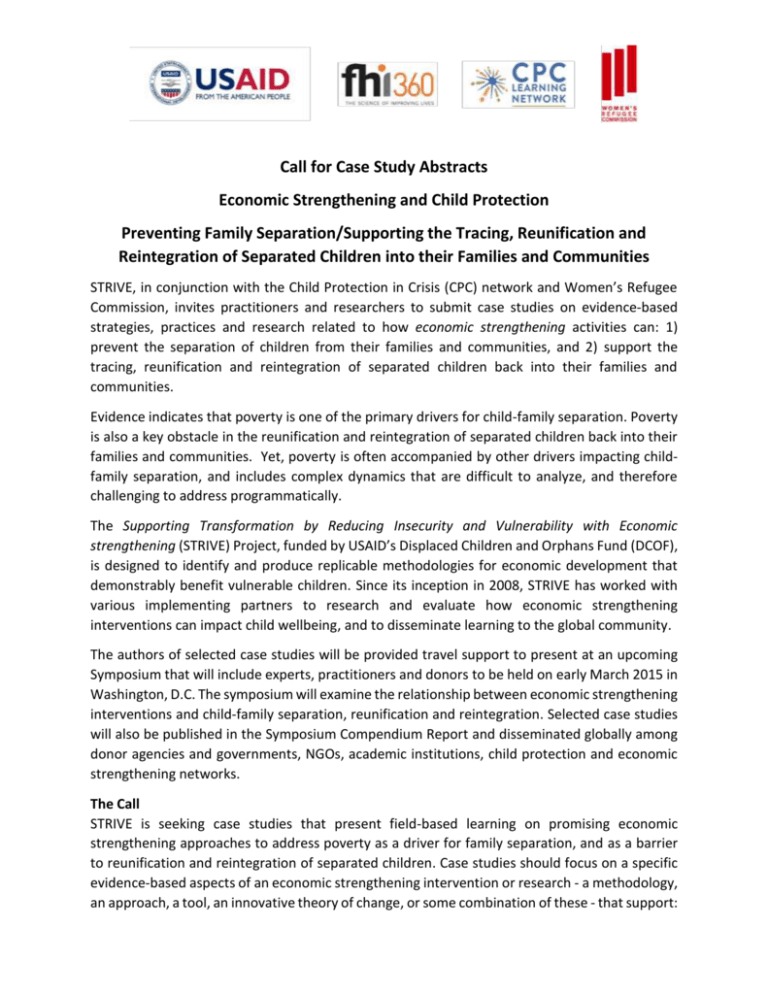
Call for Case Study Abstracts Economic Strengthening and Child Protection Preventing Family Separation/Supporting the Tracing, Reunification and Reintegration of Separated Children into their Families and Communities STRIVE, in conjunction with the Child Protection in Crisis (CPC) network and Women’s Refugee Commission, invites practitioners and researchers to submit case studies on evidence-based strategies, practices and research related to how economic strengthening activities can: 1) prevent the separation of children from their families and communities, and 2) support the tracing, reunification and reintegration of separated children back into their families and communities. Evidence indicates that poverty is one of the primary drivers for child-family separation. Poverty is also a key obstacle in the reunification and reintegration of separated children back into their families and communities. Yet, poverty is often accompanied by other drivers impacting childfamily separation, and includes complex dynamics that are difficult to analyze, and therefore challenging to address programmatically. The Supporting Transformation by Reducing Insecurity and Vulnerability with Economic strengthening (STRIVE) Project, funded by USAID’s Displaced Children and Orphans Fund (DCOF), is designed to identify and produce replicable methodologies for economic development that demonstrably benefit vulnerable children. Since its inception in 2008, STRIVE has worked with various implementing partners to research and evaluate how economic strengthening interventions can impact child wellbeing, and to disseminate learning to the global community. The authors of selected case studies will be provided travel support to present at an upcoming Symposium that will include experts, practitioners and donors to be held on early March 2015 in Washington, D.C. The symposium will examine the relationship between economic strengthening interventions and child-family separation, reunification and reintegration. Selected case studies will also be published in the Symposium Compendium Report and disseminated globally among donor agencies and governments, NGOs, academic institutions, child protection and economic strengthening networks. The Call STRIVE is seeking case studies that present field-based learning on promising economic strengthening approaches to address poverty as a driver for family separation, and as a barrier to reunification and reintegration of separated children. Case studies should focus on a specific evidence-based aspects of an economic strengthening intervention or research - a methodology, an approach, a tool, an innovative theory of change, or some combination of these - that support: 1) preventing family separation; or 2) the tracing, reunification and reintegration of separated children back into their families and communities. Case Studies may incorporate any themes that relate to economic strengthening interventions to prevent family separation, or to support the tracing, reunification and reintegration of separated children back into their families and communities. Particular themes of interest may be categorized according to: 1. Context: Humanitarian vs. Development including reasons and types of separation 2. Type of economic strengthening intervention 3. Challenges: identifying operational or programming issues and gaps related to economic strengthening interventions 4. Crosscutting issues Illustrative areas of interest include, (but not limited to): Contexts Conflict and post-conflict (fragile states) Extreme poverty (development) Natural disasters Health /Disease (HIV1, Ebola, etc.) Economic Strengthening Interventions Cash transfers; cash grants; social transfers Microfinance, including Voluntary (or Village) savings and loan associations (VSLAs) and other savings-based methodologies Insurance (including micro-insurance) Income Generating Activities (IGAs) Entrepreneurship Interventions based upon value chain analysis Skills building and workforce development Gaps and Challenges Sustainability Lack of systems and service infrastructure Cultural traditions Child labor Accountability Monitoring Cross-cutting Issues Women’s economic empowerment Gender dynamics Community-based initiatives Kinship and alternative forms of care Role of the private sector Targeting Use of innovative technologies Research methodologies to evaluate and measure attribution Holistic delivery of integrated or multisectoral and interdisciplinary interventions Social funds Please see additional information and application guidelines below. To learn more about STRIVE, please see visit the STRIVE homepage. Submission Process 1 HIV and AIDS may also be viewed as a development issue. As a first step, participants should submit a short abstract using the template provided. Selected abstracts will be invited to develop longer case studies. Abstracts are due on January 12th, 2015. A review committee will select 5-7 abstracts to be developed into case studies. Individual authors (one from each team) will be invited and provided with travel, accommodation and incidental support to present the case study at a STRIVE symposium event in March 2015 in Washington, D.C. Capacity support to assist writing up the selected abstracts as case studies may be provided. Final case studies will be published in a Symposium Compendium Report and on the project website, and disseminated globally. STAGE 1: Abstract Submission Abstracts submissions must use the template provided and must not exceed 2 pages. Submit abstracts by 5pm on January 12th, 2015 via email to STRIVE@fhi360.org indicating in the subject line "STRIVE - Call for case studies". An evaluation team will review the abstracts and evaluate them according that will include following criteria: (1) intended outcomes and impact, (2) linkage between economic strengthening intervention and the prevention of family separation, or facilitation of children’s reunification and reintegration, (3) evidence-based learning; and (4) innovation. Please note that we are not only looking lessons about effective economic strategies, but also those that include lessons about challenges to the effectiveness of economic strengthening interventions. STRIVE will provide feedback to successful applicants with questions to be addressed in the full case study or proof of concept note text. STAGE 2: Full Case Study Selected abstract authors will be invited to submit a full case study. Submissions should be no more than 5-7pages in length, and should provide practical insights on how economic strengthening activities can support child reintegration and reduce household risk of child separation from families. Capacity support may be provided to assist in writing up the case study. A template for the case study will be provided upon acceptance. Timeline and Key Dates December 11, 2014 Call for case studies released January 12, 2015 Abstract due January 15, 2015 Selected abstract authors notified February 23, 2015 Final draft of case study due March 6, 2015 (tentative) March 9, 2015 Presentation at STRIVE symposium in Washington DC March 16, 2015 Final case study due STRIVE comments to case study authors The STRIVE (Supporting Transformation by Reducing Insecurity and Vulnerability with Economic Strengthening) Program, funded by USAID’s Displaced Children and Orphans Fund (DCOF), uses marketled economic strengthening initiatives to benefit vulnerable children. In doing so, the program aims to fill current knowledge gaps on effective approaches to reducing the vulnerability of children and youth. This announcement is made possible by the support of the American people through the United States Agency for International Development (USAID). The contents are the sole responsibility of FHI 360 and do not necessarily reflect the views of USAID or the United States Government.
